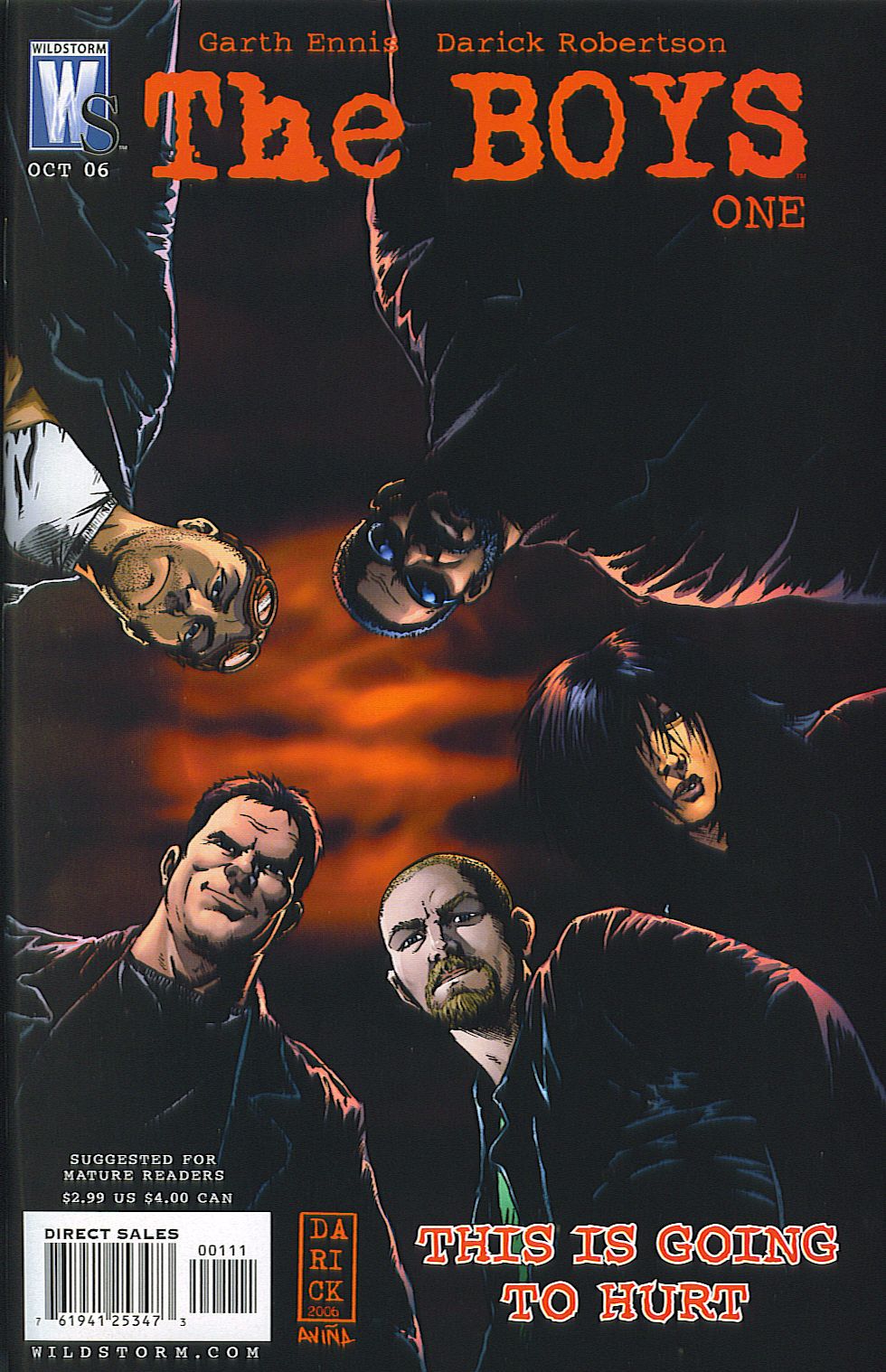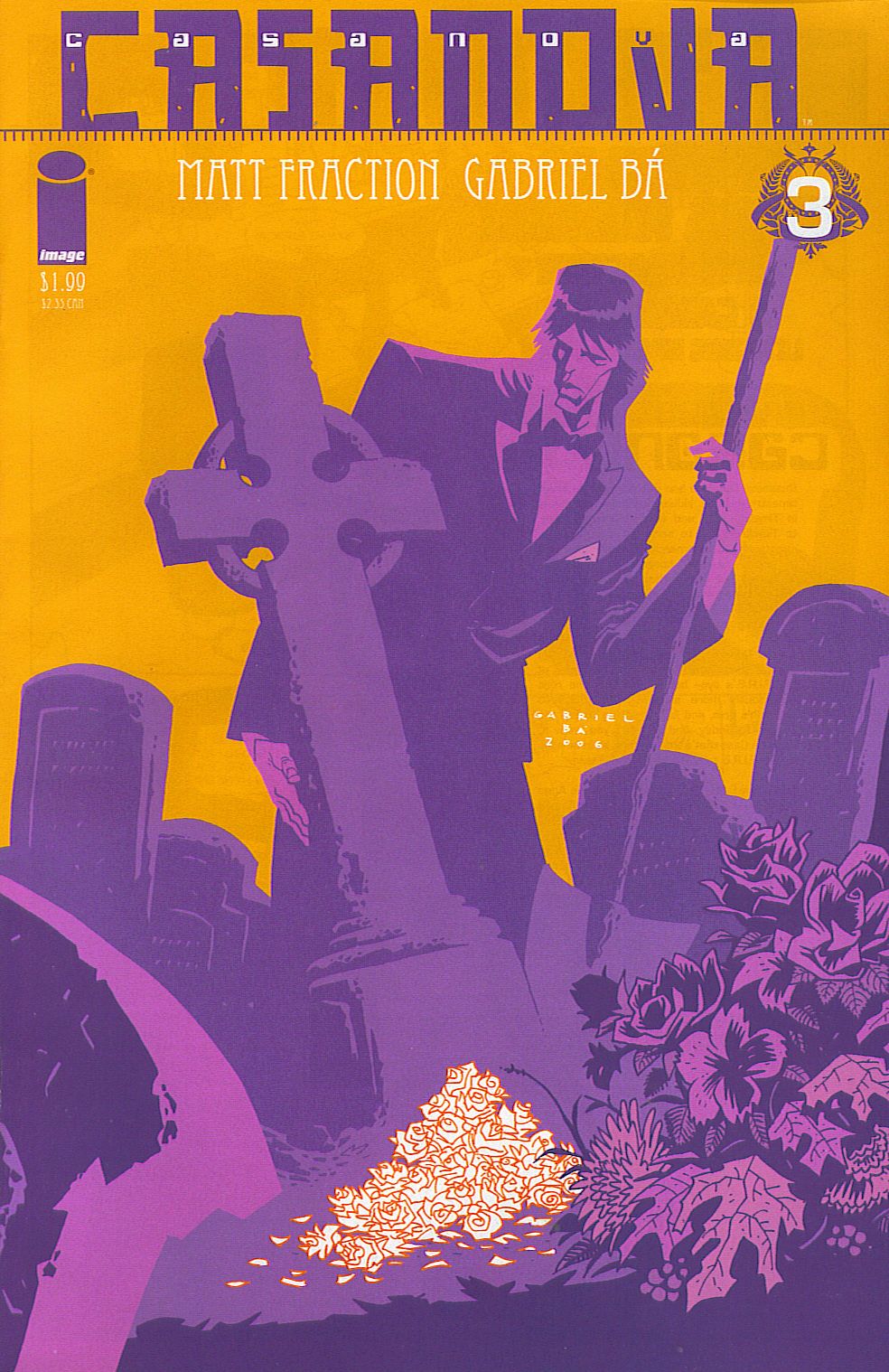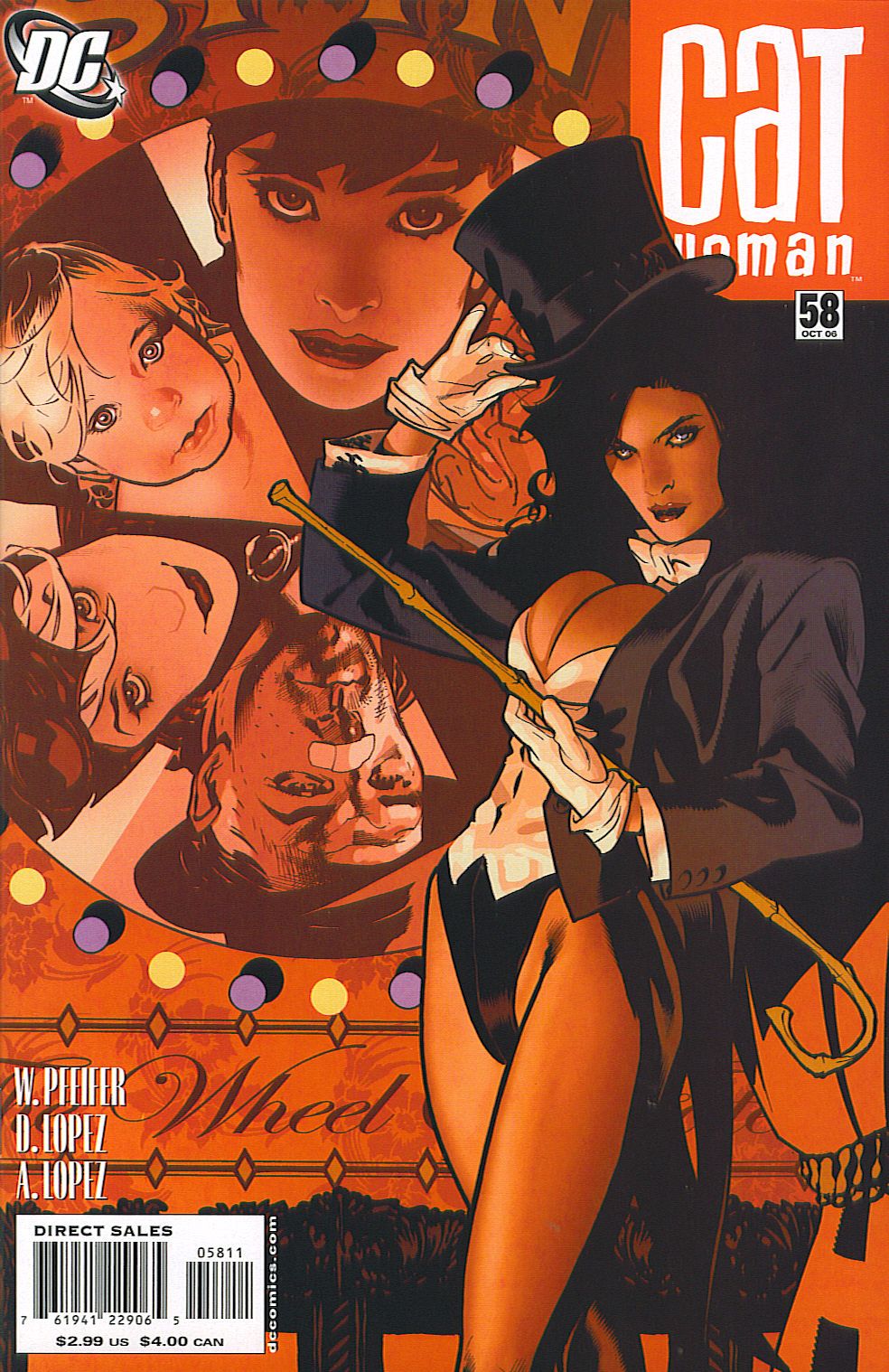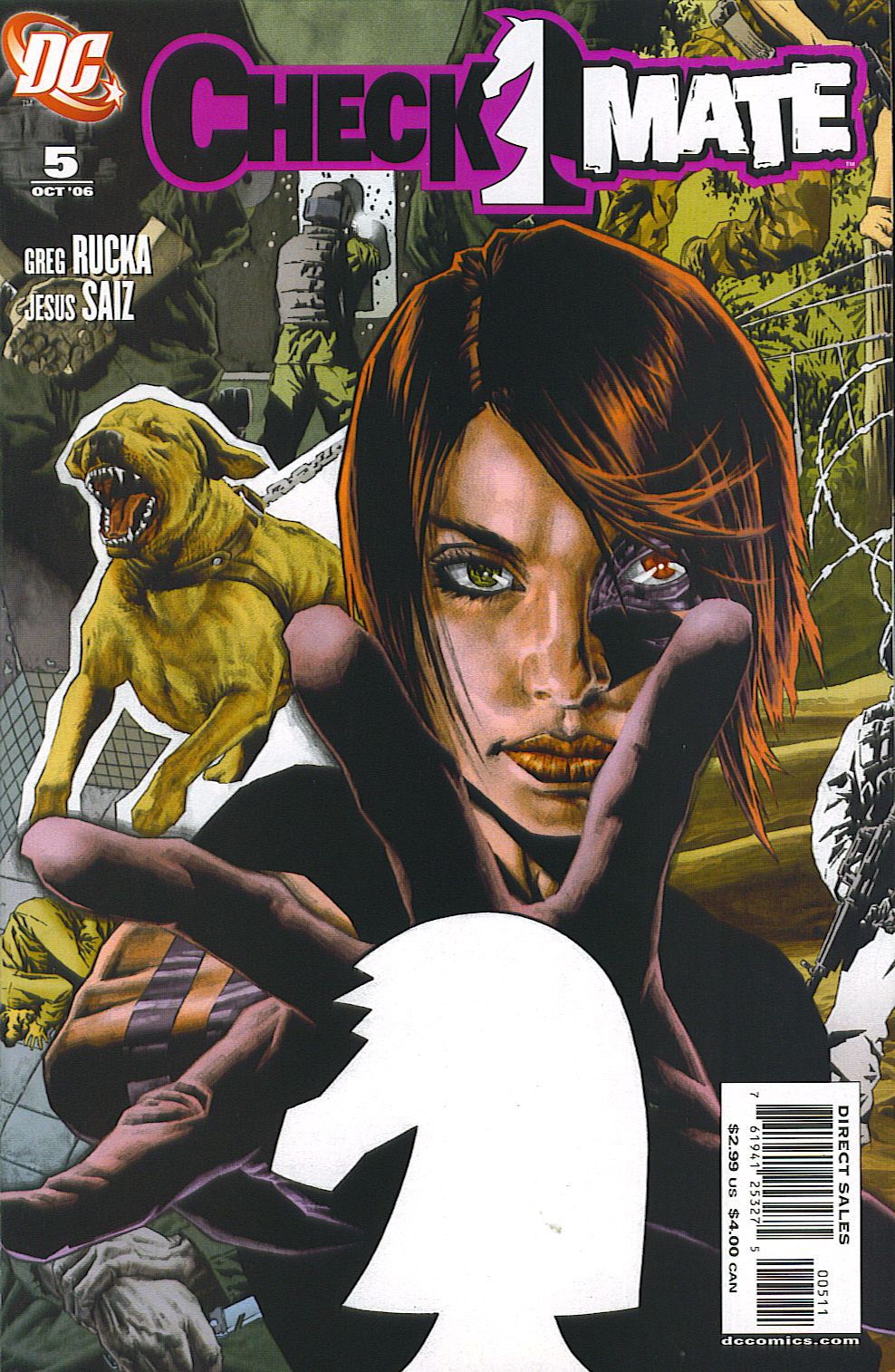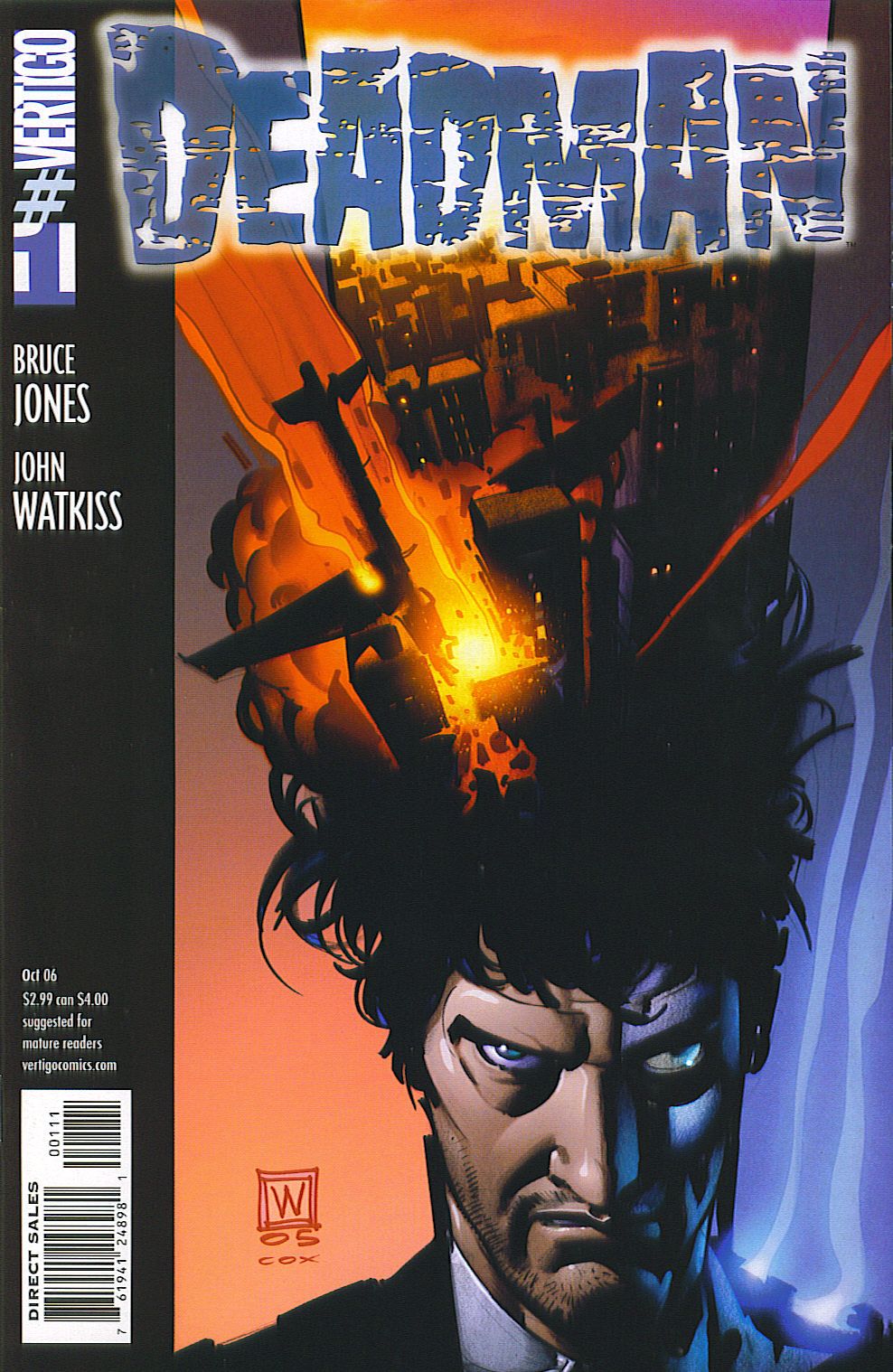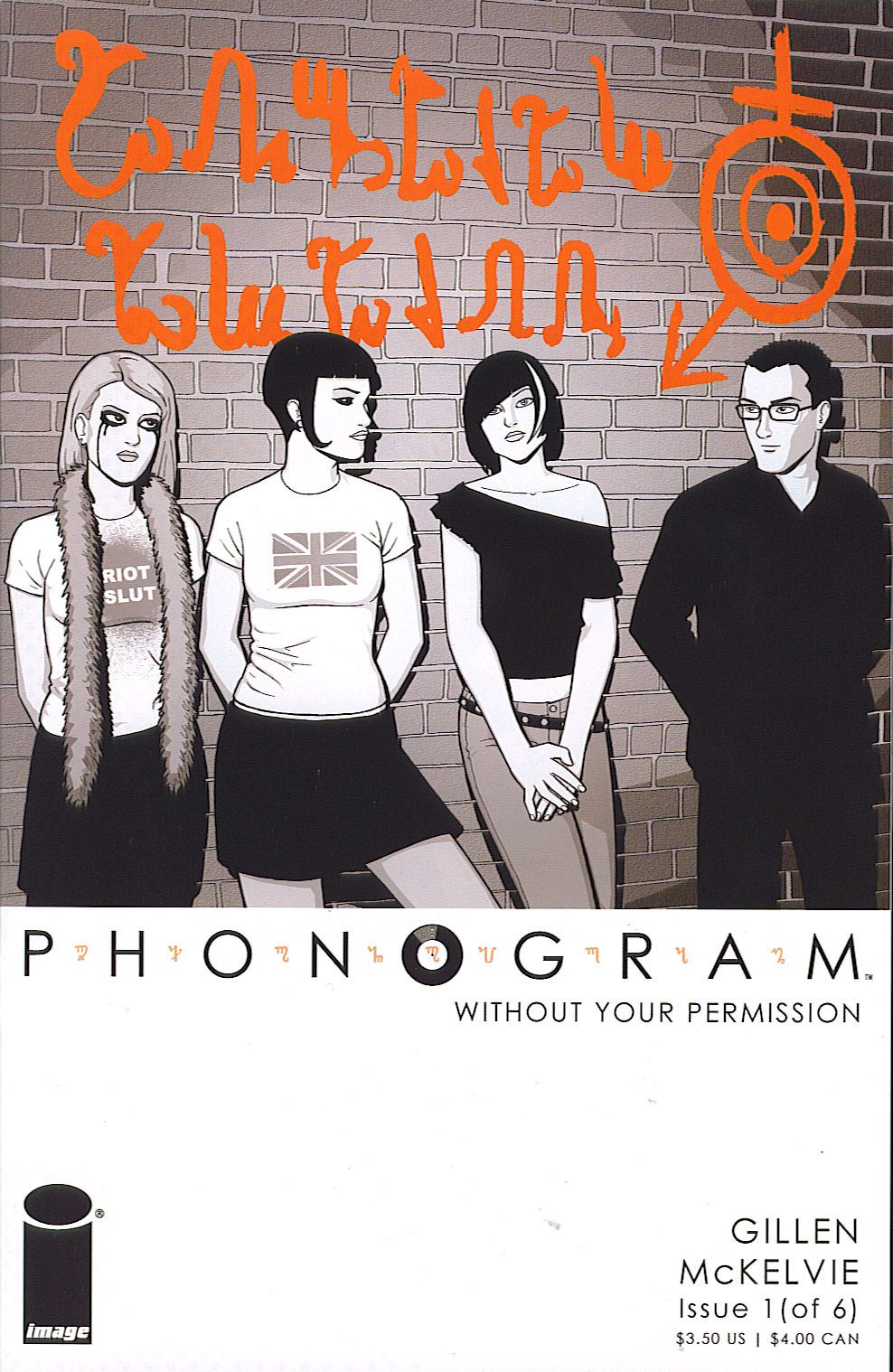It was another fine week of comic book purchasing here in the desert, and although I enjoyed everything I bought, I have a few issues with a few issues. So we'll forego the poetry for this week (to paraphrase the Moody Blues in that classic Simpsons episode: "Can the poetry, let's review some comics!"). I'm going to have to get all feminist on your asses, y'all! I hope you can forgive me! Our themes this week are: Sex played for laughs, the success and failure of non-linear narratives, and when writers might be a bit to clever for their own good. Also, I point out the greatest injustice the world has ever seen. It's true!
Let's get the party started!
The Boys #1 by Garth Ennis and Darick Robertson. $2.99, DC/Wildstorm.
Ennis and Robertson and a book about normal folk killing superheroes? Can I resist? Well, sure I can - it's only a comic book, but I wanted to give this a test drive, because I really like Ennis and Robertson can be very good and Ennis does this sort of thing very well. And I'm not quite sure why the first page has to be an image of (I guess) Butcher stomping on the head of a superhero, especially because the second page shows Butcher sitting placidly on a park bench and we never see the superhero again, but okay. I was okay with the book until page 6. If you haven't read the book yet, I'm going to spoil it for you a little.
If you've read the book, you know that on page 6 Hugh Campbell's girlfriend Robin, who has just told him she loves her, gets killed in a particularly brutal fashion. Now, Ennis is a particularly brutal writer, and he often treats his male characters much worse than his female characters, and I know he has to make Hughie hate superhero types with a burning passion, but the scene bothered me, as did the later panel showing Robin smushed into the wall. I think the real reason Hughie gets so angry is the callous attitude shown by A-Train, the superhero who apparently threw the bad guy uncaringly into a wall and in the process killed Robin, so there's no reason to show how horribly awful her death was. And although it's done seriously, I can't help but think Ennis had himself a little chuckle when he wrote it. I don't want to think that, but it's there.
Then there's Susan Rayner, the director of the CIA. Obviously, because she's a woman, she likes getting fucked violently by a real he-man, Butcher, because her husband just doesn't do it for her. Ennis is capable of writing decent women, but this bugs me. Yes, she's a bitch and Butcher is an asshole. I get it. We don't really need the ass-fucking scene, do we? And it seems to me that in comic books, when sex is allowed, it's far too often close to rape, but it's "okay" because the women like it that way. It's a way to show rape without it being rape. Sex is played for laughs in a lot of comics, and it's getting on my nerves.
What does this mean for the rest of the book? Well, Robin had to die so that Hughie could be bitter and get on the team that Butcher is putting together. I will give Ennis a pass on that (despite my reservations) because it has to be a one-time deal. The sex scene is a bit more problematic because Rayner is, after all, still alive, and she's probably going to reappear. I want to like this book because, as I said, it's the kind of thing Ennis does well, and it's not a war comic or the Punisher. It's on a short leash, though. I'll give it a few issues and see where Ennis goes with it. If he lays off the pseudo-rape and gives us superhero stomping, I can get behind it.
Casanova #3 by Matt Fraction and Gabriel Bá. $1.99, Image.
I have not been as enamored with Casanova as the rest of the comics blogaxy, because my brain is weak and I just can't figure out what the hell is going on. The fact that the issue recap in issue #2 didn't help me figure out issue #1 was a bad omen, and this issue's recap of issue #2 cleared the confusion just a bit. I remained on the fence.
This issue, however, was pretty good, and made me give Casanova a bit more leeway. In this issue, Fractiontempered the annoying bits of the first two issues - which dealt largely with the statement implicit in the whole thing - "Look how clever I am!" - and got down to more "conventional" storytelling. I don't want Casanova to be just another spy comic, buton the other hand, there's a reason surrealist literature doesn't burn up the bestseller lists. Fraction reins in the wackiness just enough to give us a coherent story with a lot of weird elements, and the balance makes this a much more interesting book than the first two issues were. If Fraction can maintain that balance, this book has a lot of potential. If he slides back into showing us how cool he is, I won't be around for it.
What Fraction does in the book is tell three "sides" to the same story, really. After the failure (or success, depending on which side you look at) of last issue's mission, Casanova is disciplined by his two employers. E.M.P.I.R.E. suspends him, but his father has a milk run mission for him that involves digging up the corpse of an agent. Newman Xeno, leader of W.A.S.T.E. takes him to task for almost getting his sister killed, and then tortures him. His sister comes in an tortures him a bit, but does tell him where his mother is. In the present, he digs the agent up with the help of two E.M.P.I.R.E. agents, but then kills them for Xeno. Being a double agent is a bit tough on Casanova. On the final page, Casanova talks to his mother, who appears to be comatose, and plots to change the world. It's quick, it's simple, and it doesn't make your head hurt.
Part of the reason why this works is because of the format. It's a 16-page comic, after all, but Fraction is telling three different stories, so he devotes five pages to each. That way he has to use an even more pared-down style, and that keeps him from going too wacky like he has been doing. The insane style remains, but the narrative must come through more, and the blend is achieved. It will be interesting to see if Fraction can keep that up.
A good issue of Casanova means that I'm on board at least a little longer. I'm still on the fence with it, but it certainly improved.
Catwoman #58 by Will Pfeifer, David López, and Alvaro Lopez. $2.99, DC.
Pfeifer likes this cover. Well, it seems like he does. I do not. It's one of the weaker Hughes covers we've seen on this book. What's up with Zatanna's pelvis and breasts? It creeps me out.
Anyway, as usual with this book, it deliver solid, meat-and-potatoes storytelling with good art. It's amazing that it's just a story, with no fancy bells and whistles, and López' art is nothing spectacular, but it's a consistently entertaining book, and Pfeifer continues to make something decent out of the Identity Crisis mess. We get two stories in this one, as Zatanna mind-wipes Angle Man and the Film Freak, while two of Black Mask's thugs go to kill Sam Bradley a year ago, after Selina killed their boss. This second story seems to imply that Bradley is Helena's father, but we'll have to wait for that. In the present, Zatanna tells Selina that mind-wiping isn't as easy as everyone thinks, something that Meltzer never bothered with, and although we're not quite sure what Zatanna does to the two men, she manages to make them forget about Irena Dubrovna. She gets Angle Man to go to the cops and confess his crimes, but Edison, interestingly enough, feels he has committed "crimes against cinema," and he decides to hackhis station manager to death, in a very beatifully rendered, "cinematic" page. Wow - amind-wipe that goes awry - what are the chances?
This continues to be the kind of book that is difficult to hate, yet is difficult to truly love. It doesn't blow you away, but it offers a story that is completely organic, uses continuity from other parts of the DCU without being a geeky wet dream, and gives us good, quality characters who make choices that might be poor, but are certainly consistent. Pfeifer is simply tellinga story, and in the attempts to make comicskewl, some writers forget that that's what it's all about.
Checkmate #5 by Greg Rucka, Jesus Saiz, and Fernando Blanco. $2.99, DC.
In a "catch-our-breath" issue of Checkmate, we get to see the fallout from the first story arc and a little of where Rucka plans to go with the story. This issue is weaker than the first four, because even though I understand the need to stop and assess occasionally, that doesn't mean I have to like it! Actually, it's a perfectly fine issue and is a good place for those people who missed the first story to jump on. It's just a tad bit dull.
That doesn't mean there isn't a lot going on, however. Four candidates are looking to become Sasha "Black Queen" Bordeaux's Knight, since the previous one (whose name escapes me) was killed back in issue #1. This is weird - there are two male and two female candidates. What does it say about me and society in general that I knew one of the two women would be the winner? The competition between the four is the standard "survive-and-move-on" kind of thing, with a climb up a mountain to retrieve a chess piece while Count Vertigo does his vertiginous thing, plus a fake capture by Kobra and some good torturing (Rucka must have been watching The Recruit while typing the script), and finallya hand-to-hand DeathMatchâ„¢ to determine the winner. I knew it would be a woman. Why is that?
The other fallout is Alan Scott's ouster as White King. Mister Terrific - his Bishop - wants to resign because he's all bent out of shape that they would dare can Green Lantern, but Scott tells him he wants Terrific to take over as White King, and that the U.S. wouldn't be able to stop it. This would put a strain on his relationship with Sasha, because there will be a perceived conflict of interest. So they have to decide what to do, because Sasha says she can't leave Checkmate - she has to atone for allowing Maxwell Lord to kill Ted. This will play out in future issues, as will what's going on with Beatriz, who has a confrontation with Amanda Waller about her role in Checkmate. Waller is blackmailing Beatriz over something in her past - presumably a horrible deed she did for the all-powerful Brazilian spy service, and she doesn't want to talk about it. Oh, Beatriz - don't you know that you're in a comic book, and covering things up will only make them worse? You crazy Latina!
Like I said, a lot going on. The reason it doesn't really work too well is because the selection process takes up a large part of the book, and that's the most boring part. However, it does, like I said, allow us to catch our breath and set things up for the future, with the Suicide Squad (!!!!) showing up next issue. That. Will. Be. Awesome. Despite the relative weakness of this issue, it's still a very good book. And Blanco needs to "finish" Saiz more often, because the art is less harsh than in the first story arc, when Saiz was inking himself. It's a nice change.
Deadman #1 by Bruce Jones and John Watkiss. $2.99, DC/Vertigo.
Brian has already reviewed this and liked it, calling it "neat." Well, I didn't like it quite as much as he did, but I liked it enough to be on board with it for a few issues, to see where Jones is going. How's that for a recommendation?
The problem with it is the way Jones structures the story. Casanova does the whole non-linear narrative as well, and in the latest issue, Fraction does it well. Jones does it too, and it doesn't work quite as well. It's not that it's confusing - we know pretty much what's going on at all times - it's that it's not confusing enough. Now that I have thoroughly confused you, lemme 'splain.
In the first two issues of Casanova, Fraction seemed too clever for his own good. Jones doesn't do that, which is nice, but it becomes clear very quickly that he wants to establish Brandon Cayce's personality, and to do that, he comes up with the device of having Brandon's life flash before his eyes while his brother, Scott, is inexplicably crashing a plane deliberately into London. Brandon does not survive the crash, but his soul decides to go back into his body and reanimate it. Why he does this is not exactly clear (he says it's to figure out why his brother crashed the plane, but he's dead - who cares?), but I assume Jones will get to it before fifty issues have passed and it won't have anything to do with a gamma-irradiated dude with a big brain. The life flashing before his eyes motif is cliched, but that's okay. What bothers me is that it's too coherent - we get a lot of information about Brandon's life fed to us, not through big blocks of text, which would have been annoying, but through the scenes and dialogue, which is a decent way to do it. I would have liked the scenes to be shorter and more staccato - as if, you know, his life really was flashing before his eyes. Part of the mystery of the book should be why his brother crashed the plane, something he hints at, and why Brandon is so intrigued by it that he comes back to life. But another part of the mystery should be what happened between the two brothers and Sarah, or what happened to their father. Thanks to the flashbacks, we know all that. I hope Jones will return to it and get into it a bit more, but the mystery is gone.
I realize that I criticized Casanova for being too oblique and this for not being oblique enough, but there is a fine line between the two, and I wish both had approached it, albeit from different directions. This is certainly an intriguing first issue, and Jones does a nice job setting up the story, but it was just a bit frustrating. Watkiss' art is beautiful asusual. What else is there to say?
This is another book, like The Boys, that I will pick up for a bit and see. It's a better first issue than the Ennis book, though, so it might last a bit longer.
Nextwave: Agents of H.A.T.E. #7by Warren Ellis, Stuart Immonen, and Wade von Grawbadger. $2.99, Marvel.
I have expressed my reservations about whether I should still buy Nextwave, and you see that I still am. I'd like to point out again that I have liked every issue, but I just wonder where it's going and what the point is. I'm still wondering, but this was a much better issue than the previous two, for one good reason: less Dirk Anger.
Anger was a fun character for about 1.5 issues. Then he wore real thin real quick. In this issue he shows up only for two pages, and even that is about one page too many. Wouldn't it be nice if Ellis killed him off in a hilariously gruesome manner? I doubt he will, because I get the feeling Ellis really, really likes him.
But the rest of the issue is solid and, remarkably, very funny. Yes, this is supposed to be a funny book, but the last two issues have been strangely devoid of real funny moments. This issue gives us the Dread Rorkannu, who trades a legion of Mindless Ones to the Beyond Corporation for "a hundred of the Earth dollars" and a gaggle of Suicide Girls ("no blondes," says the Dread Rorkannu), then we get two pages of the Captain explaining to Aaron Stack how he went through every derivation of "Captain _____" he could think of, but someone else always had the name, which goes on a bit long but is still funny, and then Monica tells Elsa about all the guys on the Avengers who hit on her, which is very funny. Thor and his "magic hammer" - oh, that wacky Ellis! And another great line - "X-Men come back more than Jesus." Fine, fine stuff. The fight with the Mindless Ones is sufficiently explosive, although Ellis rips off Grant Morrison when the Captain wishes he could think of something funny to say, and the censors amazingly allowed Ellis a cum joke, which I thought was funny. Of course, there are more Mindless Ones, meaning there will be more punching next issue. All in all, a fun read.
I do have one question: Monica mentions the "Marketing Plan," which is why they're headed to Colorado to confront the Mindless Ones in the first place. I'm sure I missed it, but what the heck is that? Remember, my mind is weak, so I'm sure Ellis mentioned it before. Help me, Nextwave acolytes!
Phonogram #1 (of 6) by Kieron Gillen and Jamie McKelvie. $3.50, Image.
Okay, so I know you could find some pages of this on-line, but I don't read my comics on-line, so I didn't check it out. And then Kieron Gillen goes and sends a review copy to Cronin, leaving me to buy it like a sucker. I wept all day yesterday, Mr. Gillen. Do you see what you've done????
Phonogram is a good book, though, so I may have to forgive Mr. Gillen. Note the use of the word may. It's a book about a magician named David Kohl, who is a complete dick, and a task he's given by a weird goddess-type chick because he owes her one. He meets this goddess-type chick in the bathroom of a club that's hosting a musical festival for women. So, you know, there are a lot of lesbians there. The entire issue takes place in the club, and that's basically the plot.
However, the plot doesn't really matter yet, because Gillen is, as he writes in the liner notes, trying to put together a book that links pop music to magic, so the mood of the book is just as important as the plot. With first issues, plot often doesn't matter too much (The Boys and Deadman don't have much of one, after all), because we know it's a set up. You can use plot to set things up, but you don't really have to. So Gillen wants to evoke a mood, and he does a very good job of it. Of course, the mood he sets up will make or break the book for you, because like the first issue of Casanova (there I go again), this book tries very hard to be clever.
It's not as aggressively clever as Fraction's first issue. It doesn't proclaim its cleverness as the greatest thing in the world. As Gillen even mentions, he wanted to write a book where you could enjoy it without getting all the references, and he has succeeded, for the most part. But the book is still packed with references to various pop music, and Gillen helpfully provides a glossary in the back. Glossaries in the back of books are tricky, because on the one hand, the fact that one exists might mean the writing is a bit too reference-laden to be viable, but on the other hand, they're interesting to read. Gillen is walking a tightrope here, and with a six-issue mini-series, I think he might be able to pull it off.
David Kohl is a dick, as I said, but he's somewhat of a charming dick, and that's why this issue works for me. He takes advantage of a girl's love for an obscure pop band, but people are always doing that. He insults the lesbian chic thing going on at the club, but it's so ridiculously over-the-top that it becomes weirdly charming (and I kind of like Le Tigre, by the way). He gets his comeuppance but remains insouciant. He's an interesting dude.
Finally, we have another sex scene played for laughs. Whereas in The Boys, the "comedy" is off-base and disturbing, here it's actually funny. The idea that a woman could be as clueless about pleasuring a woman as men are portrayed is clever without being cruel. It's perhaps an unnecessary scene that pushes the book into NC-17 territory, but the point is that sex can be funny without being ugly.
It's $3.50, which is a chunk of change, I know, but it's an interesting little comic book that walks a fine line between informative and condescending. I am looking forward to the next issue (which I will read) because I want to see what happens when the book acquires a plot. A nice debut, though.
Rex Mundi #1 by Arvid Nelson and Juan Ferreyra. $2.99, Dark Horse.
Whenever I start to think that I'm burned out on comics, one of two titles shows up and reminds we how cool they are. One of those books is Planetary, and the other is Rex Mundi. The Dark Horse era for the book begins with a new #1 issue, which is actually #19, which is actually the twentieth issue (the series began with a zero issue). So if you're expecting a nice origin story for a new #1, don't hold your breath - we dive right into the continuing saga of 1930s France!
This is a typically strong issue, as the Duke of Lorraine bombards Versailles and eventually captures the king while the Mayor of the Court shoots himself in the head. Meanwhile, Julien is being held by the Inquisition, but he escapes before they can do any real damage. Genevieve shows up to drive him out of there, not before exhibiting a bit of her magical powers, and presumably our heroes will head south to the Languedoc to continue to unravel the mystery of the Grail while France teeters on the brink of civil war and the Germans mass their armies on the border! It's World War I time in the alternate universe of Rex Mundi!
As usual, it's difficult for me to offer much in the way of criticism or praise for the book, because it's one of my favorites. Nelson is doing such a nice job of telling both stories - I know it's slow, but the little things about each tale add to the grand tapestry of the epic, and I for one appreciate the pace. The parallels between Bush and Lorraine are there, and Nelson even admits to them, but they aren't forced and they don't take away from the narrative at all. Everything that has happened with regard to the Spanish Marches and the Cordovan Emirate in Spain is perfectly logical from a historical viewpoint. And the Grail story, while part of a bigger trend in literature these days, is unusual and interesting enough to stand on its own.
Ferreyra's artwork is stunning, as well. Not only are the drawings beautiful, but Ferreyra is coloring the book too, and he does a magnificent job with that. Lorraine's face when he discovers Martel's body is truly frightening. He smiles because one of his rivals is gone, and the drawing is creepy enough, but he's backlit, which shrouds his face in shadows, and his eyes open wide with almost post-orgasmic pleasure. It's a small panel, but shows off all Ferreyra's strengths.
Another fine issue of a great comic book. My continued hope is that with Dark Horse behind it and a movie deal in the works (at least I think there is - I seem to recall reading the news about it), Nelson can keep up the every-other-month schedule, because its erratic publishing frequency has kept it, I think, from getting a bigger audience.
Read Rex Mundi! The trades should still be out there, and Dark Horse is re-releasing them soon!
Well, that's all for this week. I still can't understand how Cronin, who, let's face it, is all hype, gets free copies of comics (even from the big boys like DC) and I, who's all about the content and not at all about gimmicks like sonnet reviews, get nothing (except, you know, when I do). Oh, the injustice! I have managed to wipe the tears away and submit these reviews to you. Do you see how I care about the people?


